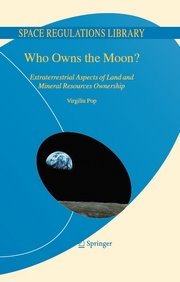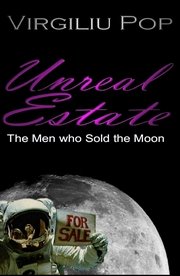I published this article on spacedaily.com: This week, members of the international space community come together at the Waikoloa Beach Marriott Hotel in Hawaii, the venue of the International Lunar Conference 2003. Among many topics addressing humanity's return to the Moon, one session is dedicated to the issue of lunar property rights, with the commendable intention to find out "Who Owns the Moon".
For the past few years, I have been trying as well to come out with an answer to this question. Trust me - it is not an easy, straight forward task; it would take a whole doctoral thesis to analyse all the aspects of this topic. It is far easier to debunk the fairy tale that the Moon is owned by one Dennis Hope.
In order to do so, we should first take an imaginary trip to the homeland of the Masai. The tall, red-robed tribesmen are the most scenic people of Eastern Africa. Leading a traditional way of life, they have few possessions. But they believe that, by divine command, all the cows in the world belong to them, even though some may have temporarily found themselves in the possession of others. When the Masai raid their neighbours and seize their cows, they are vindicated by their legal system: they are simply returning the cattle to their rightful owners.
The cows in Africa, the cows in Europe, the cows grazing in the fields of Texas, the calf just born this minute in India - they are all the property of the Masai. Your own cow, or what you thought to be your own cow, is not yours. It belongs to the Masai. So they say.
Just like the Moon and the eight uninhabited planets of the solar system together with their own moons belong to Mr. Dennis Hope. So he says. And asteroid Eros belongs to Mr. Gregory Nemitz. So he says. And the Sun belongs to me. So I say since 2001, when I claimed its ownership in front of a computer, in order to show how ridiculous this approach is.
As a specialist in extraterrestrial property rights, I do not necessarily oppose the idea of property rights in outer space, as I do not oppose cattle ownership. The main issue I dispute, is the "it is mine, because I say so" approach - be it in its bovine or lunar form. If a claim alone would entail ownership, this would entitle the Masai to universal cattle ownership. Yet, in reality, people continue to buy and sell cattle without involving the Masai, regardless of what the latter believe.
In a paper I published in Space Policy, I outlined the necessity of a physical act of appropriation for the formation of property rights, a simple act of the mind being insufficient on its own. I also stated that should Dennis Hope manage to land a claim on the Moon, then and only then might he show evidence of corpus possidendi in support of his claim, although at that time further legal problems will need to be discussed, such as its extent and its validity in the light of the Outer Space Treaty's non-appropriation principle.
Mr. Hope is nowadays one step closer to that requirement, planning to send his Registry Archive to the Moon with what appears to be TransOrbital's Trailblazer mission. But the Trailblazer mission is open to everybody, not only to the Lunar Embassy, and in exchange for $16.95 I can send my own concurrent claim to the Moon, or any other message like "I am the king of the Moon", or "Good luck Mr. Gorsky".
From a legal point of view, sending one's claim to the Moon would no doubt enhance it, but, at the very best, its effect would be limited to a pint-sized lunar plot. And it remains the question of compatibility with the Outer Space Treaty, together with the fact that Mr. Hope claims to own more celestial bodies than the soon-to-be-impacted Moon.
According to the Lunar Embassy website, "one can become the legal owner of an extraterrestrial body, if you are the first one that claimed it, and that is the Lunar Embassy". While the first statement is legally inaccurate, the second statement is factually inaccurate. The Lunar Embassy is not the first entity to have claimed the Moon. If wolves and dogs have howled at it since time immemorial, many actual claims precede Dennis Hope's one, dating from 1980.
Take, for instance, the "Elves', Gnomes', and Little Men's Science Fiction, Chowder, and Marching Society" - a Berkley science fiction fan club. In February 1952, they notified both the United Nations and the United States President about their claim of a triangular lunar area in Mare Tranquilitatis. It was a "publicity gag" intended to boost their reputation in the Bay Area; instead, it made the headlines across the globe. Their claim did not go however unchallenged; the objection came from one Alexander F. Victor of the Monterrey peninsula, who informed the Little Men that they couldn't make a claim on the Moon - because he already owned it…
In 1953, an independent claim - this time for the whole of the Moon - occurred in Chile. Jenaro Gajardo Vera, a lawyer in Talca, was elected director of a local social club. Having received one negative vote on the grounds he did not posses any significant fortune, Gajardo noted there was an important material good no-one else has previously claimed: the Moon. In accordance with Chilean law, he published his lunar claim in three issues of the "Diario Oficial" - the Chilean Official Journal - with no opposition to his deeds. This earned him the apologies from his opponent, who conceded having learnt an important lesson.
The story goes that the Chilean authorities sent Internal Revenue inspectors to Gajardo's residence in order to collect taxes for being the owner of the Moon. Gajardo is said to have agreed, on the condition that the inspectors first visit his extraterrestrial property, measure and appraise it.
Another anecdote relates about Gajardo receiving in May 1969, prior to the first lunar landing, a telegram from US President Richard Nixon delivered by a US Embassy representative: "On behalf of the people of the United States, I request your authorization so that astronauts Aldrin, Collins and Armstrong may land on the satellite that belongs to you". As a note, no crew of three was ever meant to actually land on the Moon… Gajardo's will stipulates, inter alia: "I leave to my people the Moon, full of love for its sorrows".
1955 saw Robert R. Coles, former chairman of New York's "Hayden Planetarium", incorporating and selling lots on the moon for one dollar per acre - confident that no one else had claimed the Moon.
On April the 6th, 1966, in celebration of a century from the incorporation of the city of Geneva, Ohio, 35 representatives of its citizenry signed a "Declaration of Lunar Ownership". Emulating the US "Declaration of Independence", the document avows: "When in the course of human events and space-age accomplishments, the destiny of mankind becomes influenced … [by] the presence of a particular controversial Celestial Body unclaimed and unregulated … it should be advisable and honourable … to lay definitive and prior claim to the entire physical mass and any and all aura, aspect, imaginative or otherwise, of … the Moon".
The Ohio conurbation consequently assumes "full possession and complete responsibility" of the Moon, and "bows to no man or State in its sovereign right so to do". The document provides for the sale, rent or lease of the visible lunar face "to desirable applicants upon a two-thirds vote of the entire population of Geneva", granting the US Government "prior option to this privilege". For the year 1966, the document allows the sale of 100 deeds "for the sum of $100 describing 100 acres from Mare Umbriam"; "[t]he possessor of this deed shall have it to hold, his heirs and assigns forever and unencumbered."
And the story could go on and on. What matters is that Mr. Hope's is not the sole lunar claim, and is by no means the first one. If I recall well, science fiction author Orson Scott Card once wrote - "You all think you own the moon, just because you never see anybody else looking at it".
The most logical question one could ask would be - if Mr. Hope's is just one of the many claims, and not even the first one, why do all the people "buy" lunar plots from him, and not from Chile, from Geneva, Ohio, or from the Hayden Planetarium? The answer has nothing to do with the alleged lawfulness of Mr Hope's claim, but with the advent of the Internet and with Mr. Hope's marketing genius in taking advantage of this new means of communication. His claim was made back in 1980, but the business did not take off until the mid '90's, when his website came online. In contrast, the old claimants did not have the internet at that time, so their ventures never really took off.
Having mentioned the net, those in search of entertainment may have come upon a web site operated by Digital Minds. On Buyuranus.com, one can have a laugh by "purchasing" anything "from the rings of Uranus to the gases deep inside Uranus", or even one of the "big, fat moons of Uranus, after all, what good is Uranus without a good moon occasionally?"
The potential buyer is motivated by an existential question: "Can you afford not to own Uranus?" - and by the scatological humour of Digital Minds, founders of R.E.C.T.U.M. (Real Estate Commission & Trust of Uranus Management), the registry for the "Uranus Deed Registration". Unlike Dennis Hope's Lunar Embassy, Digital Minds know their law; in the website disclaimer, they acknowledge that -
"BuyUranus.com is a novelty site operated for entertainment purposes only. All of the merchandise for sale on this site is only for entertainment and holds no value other than it's entertaining nature. Digital Minds in no way claims that when you buy a piece of Uranus that you have any legal claim to that little piece of the Solar System unless you go up there and put a fence around it personally......"
Their approach is not based on deception, but on pure sense of humour (most of the people pronouncing the name of the seventh planet rear-end like), and the buyer knows that he or she would simply buy a piece of paper with no other value than a good laugh. This is instead of being conned into believing that he or she actually owns that extraterrestrial property, like the Lunar Embassy does when stating that a "novel gift" -
"does not diminish the value of the property that you purchase in any way, as every deed is recorded and registered in the Lunar Embassy's registration database and every owners information is listed with that registration. You own this property."
Should the Lunar Embassy adopt the buyuranus.com method, and stop conning people into believing it actually owns the Moon and the planets, it would still remain the leader of the "extraterrestrial real estate" industry given the already existing publicity, and people would still buy funny pieces of paper for a laugh, this time in full knowledge of the facts. Hopefully, this would also dissuade the Masai from claiming the Taurus constellation as their own.
Thursday, November 20, 2003
Dennis Hope, the Masai, and the Moon
Saturday, November 15, 2003
An African Tale
To Kevin and Will
The sun was setting in Zululand. On the dusty road, a traveler was approaching a small village. In the twilight, its straw roofs seemed like gold - yet nothing was further from the truth, for its villagers were paupers.
-Good evening - said the traveler as he approached a hut. My name is Wernher, and I think I lost my way. May I spend the night as your guest?
- Sawubona - said the villager. I am Malusi; you are welcome in my house - but it won’t be too comfortable for a Mzungu, for the roof is broken, you can see the moon through it!
- I love the moon - smiled the man. In fact, that is what I do for living. I build rockets that go up there, and one day we may even go to Mars!
- The Moon and Mars have been above us yesterday - said Malusi. They will be above us in a thousand years. But, my family won’t last many years. We are hungry and ill – wouldn’t the money you burn in the sky be better spent here, on earth?
Wernher felt embarrassed. Maybe Malusi was right. Maybe space exploration wasn’t such a good idea when other people haven’t got a roof above. He promised to convince his government that what they were doing is wrong, and that he’ll return one day with food for Malusi’s people.
The sky has already darkened when Malusi saw two people approaching. He greeted them, and offered them hospitality - for they seemed tired from carrying a giant bird.
- My name is Wilbur, and I thank you for your kindness. My brother and I need a rest indeed, for tomorrow we shall try to fly. This thing of wood and cloth will carry us to the sky, where only the birds dare.
Malusi approached the device, and said: It is an amazing thing indeed - but with the materials for your bird, I could cover my broken roof, and make enough bows and spears for all the villagers to hunt. We are poor, and hungry. Isn’t this bird a waste of useful stuff?
- Wilbur is my brother - replied Orville - and so are you. We never realized that, instead of trying to fly like the birds, we should rather help others walk in dignity on the ground. Thank you for opening our eyes.
In the shadow of the night, Malusi could distinguish the approaching silhouette of a man.
- Sawubona - said Malusi - and welcome to my village. Will you be my guest for the night?
- Thank you - replied the traveler - but I am in a hurry. I am a painter - said he, pointing towards his canvas - and tonight is a beautiful night, and I feel so inspired, I need to paint it. Don’t you think the stars are amazing tonight? And by the way, my name is Vincent.
- Yes, the stars are beautiful - conceded Malusi. But so is my daughter Lindiwe. And, while the stars clothe themselves with the mantle of the sky, my daughter hasn’t got much to put on. I beg you, sir, those pieces of cloth - may I make a dress for Lindiwe out of them?
Vincent turned towards the man. He no longer saw the stars above. Instead, he saw them reflected in Malusi’s tears. There was a starry night, inside a pair of starry eyes. He could only care.
It was almost morning when Malusi received the visit of another drifting traveler. His name was Galileo - he said - and he was an astronomer. He was carrying a strange pipe - he called it a “telescope” - and he was claiming that through it he can see the skies closer.
-I am an old man - said Malusi - and my eyes are no longer good. May I have those pieces of glass inside that pipe so that I can better see my way?
Galileo was moved. His world capsized. At the end of the day, he realized that the Earth was indeed the centre of the Universe.
All over the world, inspired by the examples of Wernher, Wilbur, Orville, Vincent and Galileo, people understood that, instead of looking above, they should rather look around themselves. And, having to keep their eyes permanently open to the material needs of the others, they lost the ability to dream.
Virgiliu Pop
Lille, November 15th, 2003





